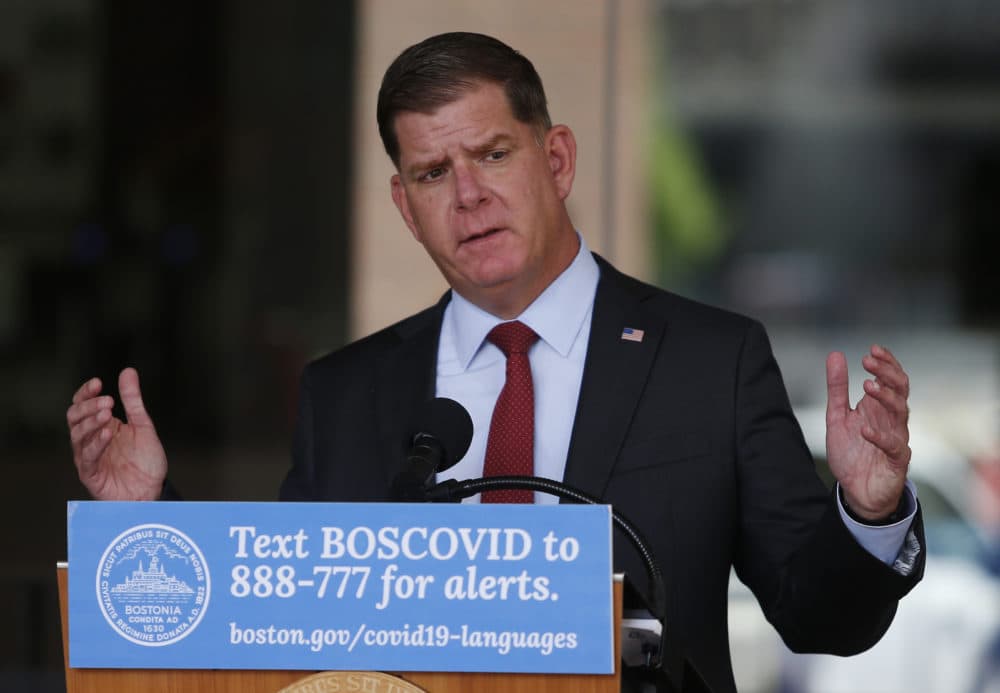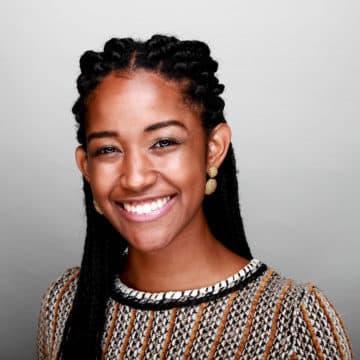Advertisement
Mayor Walsh: 'We All Have To Do Better' In Rebuilding Trust In Police
Resume
Mayor Marty Walsh says he was bothered by what he saw in videos depicting alleged violence and misconduct against demonstrators protesting police brutality on the night of May 31 and early morning of June 1.
Walsh spoke to Radio Boston host Tiziana Dearing on Monday, just a few days after body camera videos showing Boston police officers pushing down protestors with batons and indiscriminately pepper-spraying the crowd were published on the news site The Appeal.
One sergeant, who seems to admit on camera that he hit protestors with his car, has been put on administrative leave.
The police department and Suffolk County District Attorney Rachael Rollins are conducting separate investigations into the police's actions that night.
Walsh says he believes the department will do a good job investigating themselves, and he said the soon-to-be formed Office of Police Accountability and Transparency, a new department watchdog agency, will also be able to review the incidents.
"There's lots of emotions, but, you know, we all have to do better," Walsh said. "And we just have to continue to strengthen our police department in the sense of building trust."
Interview Highlights
On whether the videos are indicative of policing in Boston:
"No, I was looking at one-off behavior ... If you saw the footage right before that, it shows the officer driving through a crowd having bricks and things thrown at the car. That night of the demonstrations, unfortunately, they turned violent. We had nine officers taken to the hospital, dozens treated for injuries. We had lots of emotion out there. But what I saw in the video, that's why it was turned over to [Boston police] internal affairs to have an investigation.
"These types of situations are exactly why we're implementing body cameras for all police officers. This was captured on a body camera. So it's good to have the body cameras out there. We also put together a police reform task force after that night, committed to bringing necessary reforms and accountability.
We instituted an internal affairs oversight panel for Boston Police Department. We're also reviewing our police accountability language. So all of this stuff is not necessarily in response to just what happened that night, but really what happened with George Floyd being killed.
"And officers were hurt that night and it got way out of control. ... [That] weekend, I was down on Newbury Street and some of the business owners were upset with us because people were breaking into their stores [that night] and looting and people felt that no one's going after them.
"There's lots of emotions, but, you know, we all have to do better ... And we just have to continue to strengthen our police department in the sense of building trust and that's what we're going to do."
On what he saw in the videos:
"I know it's in the heat of the moment, but we have to, unfortunately, in a situation like that, you have to be professional. ... That's the job you're trained for as a police officer. And sometimes you can't let emotion get to you and you can't be making statements like that. That's just not what police officers do.
"You're brought into a situation to try and diffuse the situation. Now, that night's a little different, obviously, because [there were] thousands and thousands of people out there. But you still have to be the reasonable voice in that situation."
On whether anyone at the police department reviewed the footage from the protests anytime in the last six months before the videos were published:
"I'm sure they were looked at. I don't know. I can't answer that question. That's the question I have to talk to the commissioner about and see exactly what they're doing. ... But I do know, we're going to look at this particular case and any complaints that came in against people, against police officers we're going to look at.
"I think that we have to continue the work of the reform task force that we put out there. And we're going to continue to work to strengthen our police department with use of force policies. We're going to strengthen our police department with the way that they operate. All of these things were brought up to the task force."
On whether he thinks the police will do an adequate job investigating themselves:
"Absolutely. I mean, if there's wrongdoing here, the officer will be held accountable, if they find wrongdoing. And then also with the new policy, there will be still internal investigations going on subsequent to the civilian review board. So this is not just going to be one side looking at it.
"The civilian review board will have an opportunity to look at these cases. The former COOP board, they're going to have a chance to look at 100% of the internal cases as well. And they're civilians as well, looking at the cases in internal affairs."
His message to those who had a painful or angry response to the videos:
"I just want everyone to know that we're working extremely hard on this. When I saw the video, too, it bothered me, obviously. I cringed as well. The first thing I did was call the commissioner to talk about what the steps were on his behalf. And he had informed me at that point the officer was put on administrative leave before I even got a chance to call him.
"And certainly it bothered me. People should trust the police. And I know a lot of people don't. And a lot of trust has to be built and it's not going to be done overnight. But we have to do that. I mean, we have to really make sure that we build trust out there because they do serve a purpose of keeping people safe."
On his hopes for the city when it comes to policing:
"It's the systems that will make us, I believe, a national leader on the issue of policing. We're working productively with the city council as we continue to move forward here. ... We haven't run away from it. I haven't run away from it.
"We're going to do everything we can. ... A lot of people in the city love the police department. They love the work they do. At this time of year, they do lots of good things. I think we have work to do because the officers that do the good stuff, we don't want to have them labeled as somebody who are obstructionists and causing trouble because most of the officers go to work every day and do their job and try to get home at night safe and sound and not injured back to their families."
On why people were protesting that night:
"People get emotional in situations like that. People were scared that night. There were lots of scared people, including some officers who were scared. When you drive through a crowd and people are throwing bricks and sticks and want to get to you ... Nine officers were taken to the hospital that night.
"In my time as mayor and probably for the last 25 years, we've never really seen a night like that in Boston. It wasn't just Boston, it was around the country. And I've talked to mayors around the country about those situations and how do we better prepare our police departments and how do we, quite honestly, better prepare people in general?
"Let's not lose sight of the reason why people are out. That night they were out because they were in response to George Floyd being killed. It went into systemic racism. It went into situations of disparities for decades and decades in Boston, and the country. So there was lots and lots of emotion there. And, you know, this issue of police accountability in that particular case is really important for us. And that's why there's an investigation.
"We put together the task force to look at this behavior and to look at policing. But we also are doing other things. We also declared racism a public health crisis. ... So it's a lot deeper than policing. It's a systemic problem we need to work on."
This segment aired on December 21, 2020.

